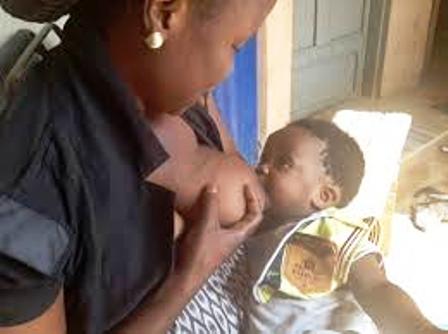Exclusive breastfeeding still not catching on
• Only 23 countries achieve above 60 per cent rate
• Nigeria among lowest countries with 17% rate


WHAT A WONDERFUL WOLRD: Some mothers still deny their babies this
The 2018 World Breastfeeding Week ends today August 7, amidst depressing statistics showing that the level of exclusive breastfeeding in Nigeria is only 17 per cent, while about 5.4 million children are being denied of its benefits every year.
But the country is not alone. A new report by UNICEF and the World Health Organization (WHO) in collaboration with the Global Breastfeeding Collective, a new initiative to increase global breastfeeding rates, show that no country in the world fully meets recommended standards for breastfeeding.
The Global Breastfeeding Scorecard, which evaluated 194 nations, found that only 40 per cent of children younger than six months are breastfed exclusively (given nothing but breast milk) and only 23 countries have exclusive breastfeeding rates above 60 per cent.
The Scorecard also reported that only 23 countries, among which are 9 African countries – Burundi, Eritrea, Kenya, Lesotho, Malawi, Rwanda, Swaziland, Uganda and Zambia – have achieved exclusive breastfeeding rates above 60 per cent are. Others are, Bolivia, Capo Verde, Cambodia, Democratic People’s Republic of Korea, Kiribati, Micronesia, Federated States of Nauru, Nepal, Peru, São Tome and Principe, Solomon Islands, Sri Lanka, Timor-Leste, and Vanuatu.
The scorecard was released at the start of World Breastfeeding Week alongside a new analysis demonstrating that an annual investment of only US$4.70 per newborn is required to increase the global rate of exclusive breastfeeding among children under six months to 50 per cent by 2025.
Nurturing the Health and Wealth of Nations: The Investment Case for Breastfeeding, suggests that meeting this target could save the lives of 520,000 children under the age of five and potentially generate US$300 billion in economic gains over 10 years, as a result of reduced illness and health care costs and increased productivity.
“Breastfeeding is one of the most effective – and cost effective – investments nations can make in the health of their youngest members and the future health of their economies and societies,” said UNICEF Executive Director Anthony Lake.
“By failing to invest in breastfeeding, we are failing mothers and their babies – and paying a double price: in lost lives and in lost opportunity.”
The investment case shows that in five of the world’s largest emerging economies—China, India, Indonesia, Mexico and Nigeria—the lack of investment in breastfeeding results in an estimated 236,000 child deaths per year and US$119 billion in economic losses.
Globally, investment in breastfeeding is far too low. Each year, governments in lower- and middle-income countries spend approximately US$250 million on breastfeeding programs; and donors provide only an additional US$85 million.
The Global Breastfeeding Collective is calling on countries to:
• Increase funding to raise breastfeeding rates from birth through two years.
• Fully implement the International Code of Marketing of Breast-milk Substitutes and relevant World Health Assembly resolutions through strong legal measures that are enforced and independently monitored by organizations free from conflicts of interest.
• Enact paid family leave and workplace breastfeeding policies, building on the International Labour Organization’s maternity protection guidelines as a minimum requirement, including provisions for the informal sector.
• Implement the Ten Steps to Successful Breastfeeding in maternity facilities, including providing breastmilk for sick and vulnerable newborns.
• Improve access to skilled breastfeeding counselling as part of comprehensive breastfeeding policies and programmes in health facilities.
• Strengthen links between health facilities and communities, and encourage community networks that protect, promote, and support breastfeeding.
• Strengthen monitoring systems that track the progress of policies, programmes, and funding towards achieving both national and global breastfeeding targets.
Breastfeeding is critical for the achievement of many of the Sustainable Development Goals. It improves nutrition (SDG2), prevents child mortality and decreases the risk of non-communicable diseases (SDG3), and supports cognitive development and education (SDG4). Breastfeeding is also an enabler to ending poverty, promoting economic growth and reducing inequalities.
Flagging off the Week in Nigeria, health Minister, Prof. Isaac Adewole urged stakeholders to intensify campaign for exclusive breastfeeding. He called on mothers to feed their babies with breast milk only, especially within the first 6 months of life as children breastfed exclusively hardly became sick.
“I must point out that a breastfed child has been provided ideal nutrition as a contributor to his/her healthy growth and development; that child is protected from incidence and severity of infectious diseases resulting in lower morbidity and mortality. The breastfed child, especially the one that is exclusively breastfed in the first six months of life rarely falls sick.
“Exclusive breastfeeding helps the post-partum mother’s womb to return to normal shape, her chance of having breast and ovarian cancers are reduced and it contributes to an increase in the space between pregnancies; and her health status is improved considerably before her next pregnancy,” he said.







0 Comments
No Comments Yet!
You can be first to comment this post!